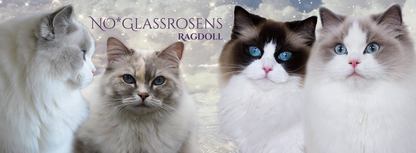LinksBreeder friends:NO*Dusty Pearl's:Links:Health related links: HCM: vgl.ucdavis.edu/services/cat/HCM.php PKD: https://pawpeds.com/pawacademy/health/pkd/ Dwarfism, by the Scandinavian Ragdoll Club: http://www.scandinavianragdoll.com/halsa/dvargvaxt-hos-ragdoll/dwarfism/ Updated info and recent statistical finds on dwarfism: http://www.scandinavianragdoll.com/halsa/dvargvaxt-hos-ragdoll/update-of-the-problem-with-dwarfism/ About the negative effects of early weaning of kittens: https://www.ncbi.nlm.nih.gov/m/pubmed/28871130/ Miscellaneous links: Mating calendar: https://www.purrinlot.com/preg.htmwww.purrinlot.com/preg.htm About the breed: https://cfa.org/ragdoll/ The white spotting factor http://www.rfwclub.org/Gwsf.htm Traditional vs original ragdolls: http://www.original-ragdoll.fr/traditional_vs_original.html Pattern chart: http://web.archive.org/web/20011216113055/http://members.aol.com/ragpride/chart2.html Color genetics: http://www.bebbles.com/1-avel/fargschema1.htm |
FAQsHere are some of the most frequently asked questions about my cats. This list will be continuously updated. If you don't find the answer to your question here, please don't hesitate to contact me!
Q: Do all ragdoll cats flop and go limp when handled? A: Ragdoll cats are generally very relaxed and happy for the attention, and a lot of them go completely limp when being handled. However, this is not true for all ragdolls. Even though they belong to the same breed, two individual ragdolls can be completely different from each other! Q: Is the ragdoll hypoallergenic? A: This is a very frequently asked question, and the answer is unfortunately a big no. Most of my allergic acquaintances have had allergic reactions when handling my cats. Q: Are ragdolls less sensitive to pain and fear than other cats? A: NO, ABSOLUTELY NOT! This is a _very_ dangerous myth running around on the internet, and it is one hundred percent not true. Q: Are ragdolls exclusively indoor cats? A: There is no right or wrong answer to this question. They are especially suitable as indoor cats, but if they live in an environment where it's safe for a cat to be outside, they can be outdoors just like any other cat. These cats are, however, very trustful and a little naive, and some of them can easily get into dangerous situations. I recommend all of my kitten buyers to keep their cats indoors. Q: How old does the kitten have to be before leaving its mother? A: Although 12 weeks is the recommended minimum age for weaning kittens, I keep my kittens for at least 14 weeks. FIFé has also changed their regulations and from January 2023, FIFé registered breeders have to keep their kittens until 14 weeks. You can read more about this in the linked article about negative effects of early weaning of kittens. Q: Why do you choose neuter early? Is it true that cats should be at least 6 months before spaying? A: That kittens must be at least 6 months old before neutering is a myth. There is nothing wrong with waiting, but there are a lot of benefits of early neutering. I will write an article to elaborate shortly, but until then, please don't hesitate to ask questions. Q: Someone is trying to sell me a Ragdoll kitten without a pedigree. How do I know if the kitten is actually a ragdoll? A: Unfortunately you can't know. A kitten without a pedigree is not a ragdoll kitten, no matter what the "breeder" tries to tell you. With no proof of lineage, it's impossible to tell what you are buying. You should always buy a kitten from a reputable breeder, and never support backyard breeders. Do not accept a cat without a pedigree! No pedigree = not a ragdoll. Q: Is it true that mixed/domestic cats are healthier than purebreds? A: No, and in some cases quite the opposite. Good breeders make sure their breeding cats are thoroughly health tested before breeding to minimize the risk of disease in their offspring. This is almost never the case with mutts. One of the reasons why purebreds appear to be overrepresented in some genetic diseases is that breeders and a lot of other owners of purebred cats get autopsies performed if their cats die suddenly, and are also more likely to make sure their sick cat gets the correct diagnosis and treatment. Q: Is it true that kittens from purebred parents from different breeds are healthier than a purebred kitten? Is there any proof of the theory of hybrid vigour? A: Hybrid vigour, the theory that offspring from two different breeds are bigger and sturdier than their purebred counterparts, has been thoroughly scientifically disproven in cats and dogs. Mixing two purebred cats doesn't make their genetic predispositions for certain diseases magically disappear. There is no reason to believe that mixing cats or dogs of two different breeds will only bring the best qualities of both breeds to the offspring, and people claiming this usually just want to try and sell you expensive "designer kittens" that are basically mutts with fancy parents. Have any further questions? Feel free to contact me, and your question may be included on the website in the future. |






